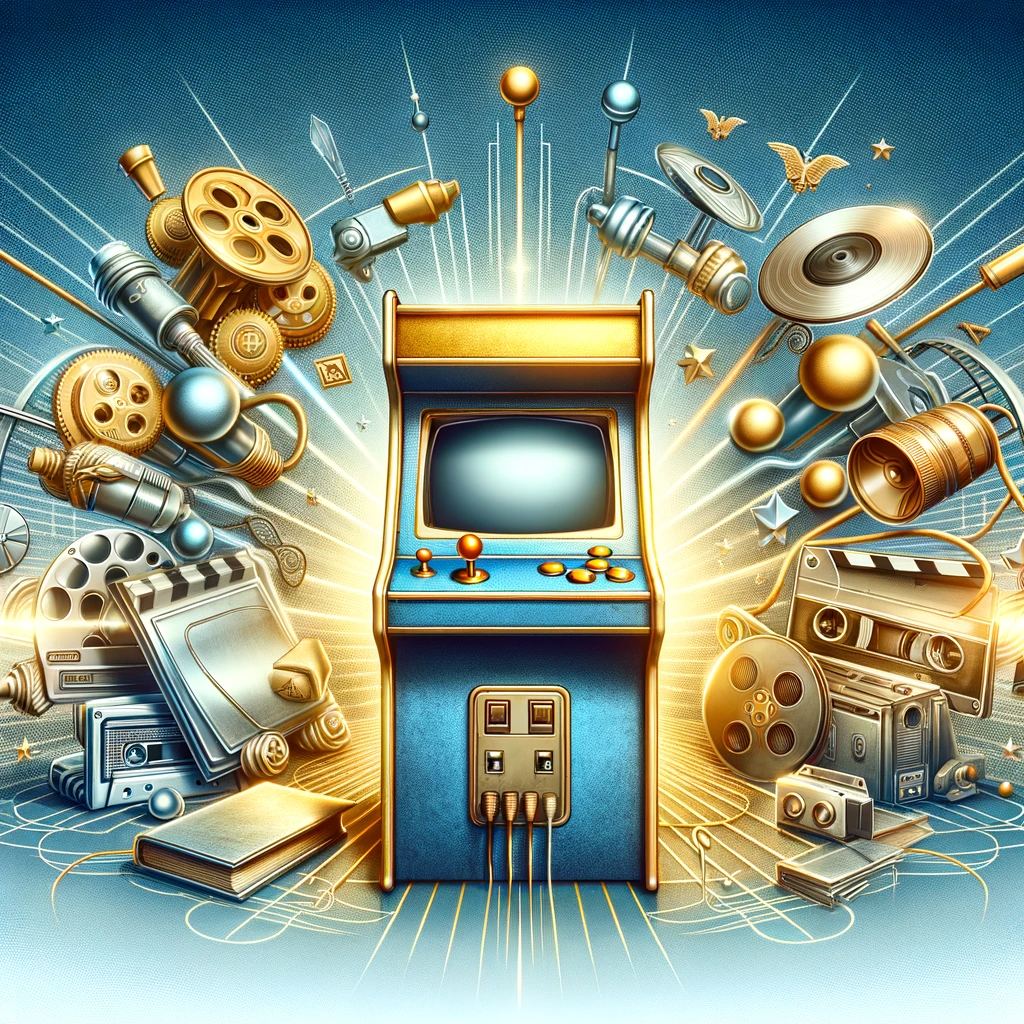The gaming industry has emerged as a global powerhouse, reshaping the entertainment landscape. With a market capitalization that skyrockets, it has become a key player in the entertainment world.
From the early days of pixelated arcade games to the modern era of lifelike graphics and immersive experiences, video games have evolved remarkably. Technological progression has been a driving force, captivating gamers of all ages.
The video game industry
The video game industry boasts an astonishing market capitalization, reflecting its exponential growth. With each passing year, it continues to break its own records. The numbers are staggering, surpassing those of the movie world and music industry combined. Let’s dive into the staggering figures and remarkable expansion of the gaming market, illustrating its undeniable prominence in the world of entertainment.
Gaming companies and their influence
Video game companies like Electronic Arts, Activision Blizzard, and Microsoft have established themselves as influential giants within the gaming industry. Their games, platforms, and innovations shape the gaming landscape.
The constant evolution of gaming
Gaming is a constantly evolving realm, with new technologies, genres, and experiences emerging regularly. From the advent of cloud gaming to the integration of virtual reality, the industry is always at the forefront of innovation.
The global gaming industry
Video games have truly become a global phenomenon, transcending cultural, linguistic, and geographical barriers. They’re not confined to any particular region or age group but have found a place in the hearts and screens of people worldwide.
This widespread appeal can be attributed to the engaging and interactive nature of gaming, which allows individuals to connect with stories, challenges, and experiences on a personal level. Recent data shows that the popularity of video games continues to surge, making them a significant force in the entertainment industry.
Mobile games and their market share
The advent of smartphones has ushered in a new era of gaming, with mobile games becoming a dominant force in the industry. These games are easily accessible to a vast audience, as nearly everyone has a smartphone in their pocket.
The mobile gaming market has grown exponentially, with millions of players downloading and enjoying games on their devices daily. This surge in popularity has led to substantial revenue, making mobile games a crucial segment of the gaming market.
Console games vs. PC games
The debate between console gaming and PC gaming has been a long-standing one, with enthusiasts on both sides defending their preferences passionately. Console games offer a streamlined and user-friendly experience, with exclusive titles that draw a dedicated fan base.
On the other hand, PC gaming provides versatility, allowing for high-end graphics and extensive modding options. The choice between the two often comes down to personal preference and gaming priorities, showcasing the diverse landscape of the industry.
The rise of Esports leagues
Esports leagues have experienced explosive growth in recent years, evolving from niche competitions to mainstream entertainment. These competitive gaming tournaments attract millions of viewers online and in arenas worldwide.
Esports teams, professional players, and dedicated fan communities have formed, contributing to the rise of this industry segment. The revenue generated from esports tournaments, sponsorships, and media rights has solidified their status as a significant player in the gaming industry.
Gaming platforms and services
Xbox Game Pass and gaming subscriptions
Gaming subscription services like Xbox Game Pass have disrupted the traditional model of purchasing individual game titles. They offer gamers a vast library of games for a fixed monthly fee, providing access to classic and newly released titles. This subscription model has gained popularity due to its cost-effectiveness and the opportunity to explore various games.
Nintendo Switch: a game-changer
Nintendo Switch has redefined the console gaming landscape by offering a unique hybrid experience. Its portability allows players to seamlessly transition between handheld and TV modes, making it a versatile gaming platform.
The console’s innovative design and strong lineup of exclusive titles have attracted a broad audience, including casual and hardcore gamers.
Cloud gaming and its potential
Cloud gaming, or game streaming, has emerged as a disruptive force in the gaming industry. It allows players to stream games directly to their devices, eliminating the need for high-end gaming hardware.
While cloud online games show immense promise in accessibility and convenience, it faces challenges such as latency issues and the need for robust internet connections. Nonetheless, it represents a potential shift in how gamers access and play their favorite titles.
The role of virtual reality in online gaming
Virtual reality (VR) has unlocked new dimensions in gaming by immersing players in captivating virtual worlds. VR headsets provide a truly immersive experience where players can interact with the game environment in ways previously unimaginable.
While VR gaming is still in its early stages, it holds immense potential for the future, especially as technology advances and VR becomes more accessible to a broader audience.
In-game purchases and micro-transactions
The concept of in-game purchases
In-game purchases, also known as micro-transactions, have become prevalent in modern video games. These transactions allow players to acquire virtual goods, items, or enhancements within the game using real money.
While the core game may be free or require a one-time purchase, in-game purchases serve as an additional revenue stream for developers. This monetization strategy has gained traction due to its potential to generate substantial income.
Impact on consumer spending
The introduction of in-game purchases has profoundly impacted consumer spending in the online gaming industry. Players can enhance their gaming experience by acquiring cosmetic items, character upgrades, or other advantages.
This “freemium” model, where the game is free but offers enticing purchases, has led to significant revenue growth. However, it has also raised concerns about the potential for overspending and the exploitation of vulnerable players.
Controversy surrounding pay-to-win models
One of the controversies associated with in-game purchases revolves around the concept of “pay-to-win” models. In some games, players can gain a competitive advantage by spending real money to acquire powerful in-game items or abilities. This has sparked debates about fairness and the integrity of competitive gaming. While some argue that it’s a way for developers to monetize their games, others believe it undermines the skill-based nature of gaming.
In-app purchases in mobile gaming
In-app purchases are particularly prominent in mobile gaming, where games are often free to download and play. These purchases can include items that enhance gameplay, remove ads, or accelerate progress.
The convenience of making small, incremental purchases directly from a mobile device has contributed to the popularity of free games. Mobile gaming has capitalized on this model, making it a substantial source of revenue in the gaming industry.
Video game streaming platforms
The emergence of video game streaming
Video game streaming platforms have risen to prominence, offering a new way for gamers to connect with their audience. Streamers broadcast their gameplay live, engaging with viewers through commentary and interaction. This trend has grown exponentially, with platforms like Twitch, YouTube Gaming, and Facebook Gaming becoming major players in the streaming scene.
Gaming’s influence on streaming services
Gaming’s influence on the broader entertainment industry is undeniable, and streaming services have taken notice. Traditional streaming giants like Netflix and Amazon Prime Video have ventured into producing video game-related content, such as adaptations of popular game franchises into series and movies. This cross-pollination of gaming and streaming reflects the industry’s adaptability and ability to capture a diverse audience.
Twitch, YouTube Gaming, and more
Twitch, YouTube Gaming, and other dedicated gaming streaming platforms have become hubs for gaming enthusiasts. They offer a space for gamers to share their experiences, build communities, and even monetize their content through subscriptions and donations from viewers. These platforms have also attracted partnerships and sponsorships, allowing gamers to turn their passion into a lucrative career.
Revenue generation through streaming
The revenue generated through video game streaming is multifaceted. Streamers can earn income through ads, donations from viewers, and sponsorships. Additionally, platforms like Twitch offer subscription tiers, allowing viewers to support their favorite streamers for exclusive benefits. This financial ecosystem has created opportunities for gamers to pursue streaming as a full-time profession, further blurring the lines between gaming and entertainment.
Gaming vs. other forms of entertainment
Gaming vs. movies: revenue comparison
When comparing the revenue generated by the gaming industry to that of the film industry, the gaming sector has been steadily closing the gap. Recent years have seen blockbuster video game releases raking in revenue, rivaling even the biggest Hollywood movies. This trend highlights the gaming industry’s increasing popularity and financial clout in the entertainment landscape.
Gaming vs. music: influence on listening habits
The gaming industry’s influence extends beyond just gaming itself. It has also impacted the way people listen to music. Many gamers now use video game soundtracks as their preferred background music, while games like Guitar Hero and Rock Band have uniquely brought gaming and music together. This fusion of gaming and music has led to changes in listening habits among gamers.
Gaming vs. books: the digital shift
The rise of digital platforms and e-books has affected the publishing industry, including books. As more people engage with video games, particularly on mobile devices and e-readers, the competition for leisure time and entertainment spending has intensified. The gaming industry’s digital nature has contributed to this shift in consumer preferences, as gamers increasingly opt for interactive experiences over traditional reading.
Consumer spending on video games vs. other entertainment
Recent data indicates a noticeable shift in consumer spending habits, with an increasing portion of entertainment budgets allocated to video games. This change is driven by factors like the variety of gaming options available, the appeal of in-game purchases, and the social aspects of multiplayer gaming. As a result, video games have become a significant contender in entertainment spending.
The top sellers of all time
2023 witnessed the release of several highly anticipated video games, with titles like “Halo Infinite” and “Elden Ring” generating substantial sales and critical acclaim. These releases demonstrated the ongoing demand for quality gaming experiences and the industry’s ability to cater to diverse tastes.
When it comes to all-time best sellers in the gaming world, iconic titles like “Minecraft,” “Tetris,” and “Grand Theft Auto V” continue to dominate the charts. These games have achieved staggering sales figures and left a lasting impact on gaming culture, solidifying their positions as classics.
The most popular consoles in gaming history
Gaming history is closely tied to the success of gaming consoles. Consoles like the PlayStation series, Xbox, and Nintendo’s various offerings have each contributed to defining eras in gaming. Understanding the popularity of these consoles provides insight into the evolving preferences of gamers over the years.
Gaming’s impact on consumer spending habits
How much are families spending on video games?
Families are allocating a significant portion of their entertainment budgets to video games. The appeal of family-friendly titles and multiplayer experiences has made gaming popular for family bonding. Understanding the extent of these expenditures sheds light on the changing dynamics of family entertainment.
Wealthier individuals often have more disposable income to invest in hobbies and entertainment, including video games. This influence on video game spending patterns highlights the role of socioeconomic factors in shaping the gaming industry’s consumer base.
The composition of a family, including the number of children and their ages, can impact video game spending. Families with multiple children may allocate more resources to gaming, while the age of children can influence the types of games and gaming platforms chosen.
The shift in entertainment spending
The shift in entertainment spending habits towards video games signifies a broader change in how people seek entertainment and leisure. As the gaming industry continues to evolve and diversify its offerings, it will likely play an increasingly pivotal role in shaping consumer spending habits across various demographics.
In-game advertising and revenue
In-game advertising has become a prominent source of revenue for the gaming industry. It involves integrating ads seamlessly into gameplay, creating a non-disruptive advertising experience. This strategy allows game developers to monetize their creations while providing players free or low-cost gaming experiences.
Recent trends indicate a steady increase in in-game advertising revenue. Advertisers recognize the vast and engaged audience within the gaming sphere, making it an attractive platform for marketing campaigns. With targeted ads and data analytics, in-game advertising has become more effective, providing a win-win situation for both developers and advertisers.
The intersection of gaming and advertising
The intersection of gaming and advertising is evolving, with partnerships and collaborations between gaming companies and brands becoming increasingly common. In-game events, product placements, and even virtual experiences within games are shaping the way advertising reaches audiences. As technology advances, this synergy between gaming and advertising is likely to continue growing.
The growth of mobile gaming
Mobile gaming has witnessed exponential growth in recent years, solidifying its dominance in the gaming industry. The accessibility and convenience of mobile devices have attracted a diverse audience, from casual gamers to hardcore enthusiasts. This surge in popularity has reshaped the gaming landscape.
Free-to-play games have played a pivotal role in the success of mobile gaming. Developers offer games for free, generating revenue through in-app purchases and advertisements. This approach lowers the entry barrier for players and encourages widespread adoption of mobile gaming.
In-app purchases and monetization strategies
In-app purchases are a cornerstone of mobile gaming monetization. These micro-transactions allow players to enhance their gaming experience with virtual items or shortcuts. Monetization strategies, such as loot boxes and season passes, have become common, contributing significantly to the revenue generated by mobile games.
The gaming industry’s impact on technology
The gaming industry has been a driving force behind technological advancements. High-performance graphics, powerful processors, and immersive sound systems have all been developed to meet the demands of modern gaming. These innovations have spilled into other industries, including film and virtual reality.
Virtual reality (VR) has found a natural home in the gaming world. VR headsets and experiences have been shaped and refined by the gaming industry’s pursuit of realism and immersion. As VR technology becomes more accessible, its applications extend beyond gaming into healthcare, education, and architecture.
Blockchain technology is revolutionizing the gaming industry by introducing unique features like ownership of in-game assets and secure transactions. Thanks to blockchain’s transparency and security, gamers can buy, sell, and trade virtual items with confidence. This innovation can disrupt traditional gaming economies and foster new opportunities for players and developers.
The future of gaming
Upcoming gaming trends
The future of gaming promises a plethora of exciting trends. From augmented reality (AR) games that blend the digital and physical worlds to the growth of indie game development, the industry is poised for continued innovation. Additionally, emerging technologies like haptic feedback and neural interfaces will enhance the immersive gaming experience.
The release of new-generation consoles like the Xbox Series X and PlayStation 5 has redefined the gaming landscape. These consoles boast unparalleled processing power and graphics capabilities, pushing the boundaries of what games can achieve. Their influence on game development and player expectations is substantial.
With its promise of streaming high-quality games to any device, cloud gaming is gaining momentum. Services like Google Stadia and NVIDIA GeForce NOW are leading the way. As internet infrastructure improves and latency decreases, cloud gaming is poised to become a mainstream way of playing video games.
Gaming and the generations
The influence of Gen Z on gaming
Generation Z, born into a digital world, profoundly impacts gaming. Their preferences for mobile and social gaming and a desire for socially connected experiences are shaping game design and marketing strategies. Gen Z is a driving force in the industry’s evolution.
Millennial gamers and their spending habits
Millennials, the first generation to grow up with video games, continue to be avid gamers. Their spending habits on gaming reflect a mix of nostalgia for classic titles and an appetite for the latest gaming experiences. They are a diverse group of gamers who bridge the gap between traditional and modern gaming.
Gaming has evolved in tandem with different generations. From the early days of arcade gaming to today’s mobile and cloud-based experiences, each generation has left its mark on the industry. Understanding these generational shifts is crucial for game developers and marketers.
Gaming’s role in entertainment streaming platforms
Entertainment streaming platforms are recognizing the appeal of gaming content. Platforms like Netflix and Amazon Prime Video are exploring gaming-related series and movies, blurring the lines between traditional media and gaming.
Gaming has become a powerful tool for user engagement on streaming platforms. Interactive experiences, live streams, and collaborations with popular streamers draw audiences and keep them engaged. Gaming’s participatory nature is reshaping how users interact with streaming services.
Gaming’s contribution to streaming revenue
The inclusion of gaming content on streaming platforms not only attracts more viewers but also generates additional revenue through advertising and subscriptions. As gaming continues to gain prominence, its financial contribution to streaming services is expected to grow significantly.
Conclusion
Gaming’s enduring impact on the entertainment industry is undeniable. It has evolved from its early days to become a global powerhouse, reshaping how people spend their leisure time. With innovations like in-game purchases, streaming platforms, and cloud gaming, the gaming industry remains at the forefront of technological advancements and consumer engagement.
As gaming thrives, it has disrupted the traditional balance of entertainment spending. Consumers allocate a significant portion of their budgets to video games, rivaling spending on movies, music, and other forms of entertainment. This shift reflects the profound influence gaming has on modern lifestyles.
In today’s entertainment landscape, gaming is a constantly evolving force. It appeals to diverse generations, influences streaming platforms, and drives technological innovation. As it moves into the future, gaming’s significance will only continue to grow, shaping the way people play, engage, and spend in entertainment.





